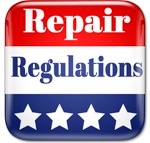 Since the inception of the Internal Revenue Code, the IRS and taxpayers have been at odds over whether expenditures on tangible property should be expensed in the year incurred or capitalized and depreciated over time.
Since the inception of the Internal Revenue Code, the IRS and taxpayers have been at odds over whether expenditures on tangible property should be expensed in the year incurred or capitalized and depreciated over time.
Historically, the distinction between deductible repairs and capital improvements has been a tangled mess, and it has mostly been left up to the “facts & circumstances” discretion of each tax auditor. To provide some clarity, the IRS issued “repair regulations,” which became effective January 1, 2014. These new repair regulations provided a “bright line test” for the auditors when making the distinction.
The safe harbor election, which is just one part of the repair regulations, allows taxpayers to write off small dollar (de minimis) expenditures for the acquisition or improvement of property. Originally, this safe harbor threshold was set at $500, but after much discussion and feedback from various groups, the IRS has recently decided to increase it to $2,500.
The new $2,500 threshold applies to any “functionally interdependent” unit of property, as substantiated by an invoice. Here’s an example of how it can be used for business purchases:
Mr. Smith purchases three muffin toasters for his restaurant. Each toaster has a cost of $2,100. Because each toaster can function on its own and has a cost of less than $2,500 per item, Mr. Smith can expense and deduct these toasters in the year of purchase, rather than depreciating them over time, assuming he follows the requirements listed below.
This new $2,500 threshold is effective starting January 1, 2016, however, the IRS will not challenge the use of the new $2,500 threshold in tax years prior to 2016, as long as the taxpayer meets certain requirements. These requirements include having a written accounting policy in place at the beginning of the year effectively adopting the $2,500 amount and, also, treating these purchases as an expense on their financial statements.
As before, businesses can still claim otherwise deductible repair and maintenance costs, even if they exceed the $2,500 threshold. For taxpayers with an applicable financial statement (i.e. audited financial statements), the de minimis or small-dollar threshold remains at $5,000.
We see this change as a great opportunity for small business owners to reduce taxes as we wait to see if the federal tax extenders bill will be approved by Congress. The tax extenders are a package of more than 50 provisions, including valuable credits, like WOTC, and deductions for businesses, like Bonus Depreciation and enhanced Section 179 amounts that expired on December 31, 2014.
The Senate and House are expected to resolve their differences on this package before they adjourn on Dec. 18 for their holiday break. However, as has happened in the past, the extender bill may not be finalized until they reconvene in January 2016.
We are here to help you with any questions you might have about the repair regulations, tax extenders, and more. Our Pennsylvania office can be reached at 888-433-1515 and our Florida office can be reached at 800-272-2733.
Check out more Tax Planning tips from Concannon Miller’s accountants here.





